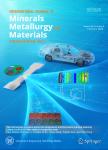Effects of different iron sources on the performance of LiFePO_4/C composite cathode materials
Effects of different iron sources on the performance of LiFePO_4/C composite cathode materials作者机构:School of Chemical Engineering and Technology Tianjin University Tianjin 300072 China Great Power Battery Co. Ltd. Guangzhou 511483 China
出 版 物:《Journal of University of Science and Technology Beijing》 (北京科技大学学报(英文版))
年 卷 期:2008年第15卷第6期
页 面:802-807页
核心收录:
学科分类:080503[工学-材料加工工程] 08[工学] 0805[工学-材料科学与工程(可授工学、理学学位)]
基 金:supported by the Science and Technology Research Item of Guangzhou China (No.2007Z3-D0021)
主 题:iron sources lithium iron phosphate cathode material solid state method
摘 要:Olivine LiFePO4/C composite cathode materials were synthesized by a solid state method in N2 + 5vol% H2 atmosphere. The effects of different iron sources, including Fe(OH)3 and FeC2O4·2H2O, on the performance of as-synthesized cathode materials were investigated and the causes were also analyzed. The crystal structure, the morphology, and the electrochemical performance of the prepared samples were characterized by X-ray diffractometry (XRD), scanning electron microscopy (SEM), laser particle-size distribution measurement, and other electrochemical techniques. The results demonstrate that the LiFePO4/C materials obtained from Fe(OH)3 at 800℃ and FeC2O4·2H2O at 700℃ have the similar electrochemical performances. The initial discharge capacities of LiFePO4/C synthesized from Fe(OH)3 and FeC2O4·2H2O are 134.5 mAh.g^-1 and 137.4 mAh.g^-1 at the C/5 rate, respectively. How- ever, the tap density of the LiFePO4/C materials obtained from Fe(OH)3 are higher, which is significant for the improvement of the capacity of the battery.



